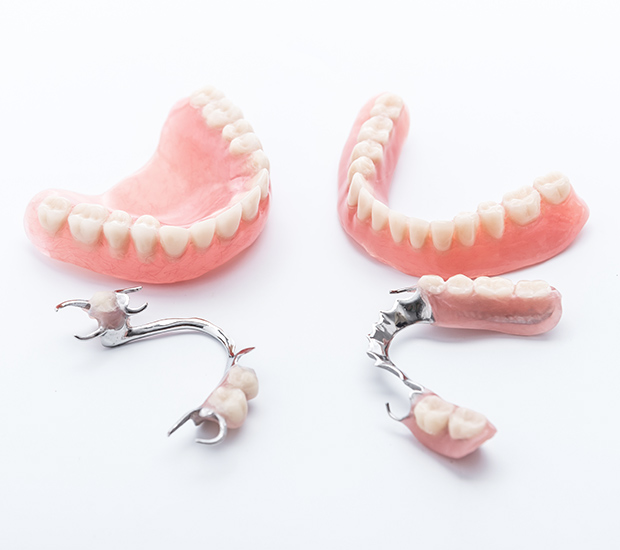Dentures and Partial Dentures Rockville, MD
Dentures and partial dentures are most commonly associated with seniors, but many young people wear them too. According to the CDC, adult tooth loss has been on the decline for roughly 70 years. Even so, many Americans rely on dentures to improve not just their smiles but also their speech and ability to chew food comfortably. Dentures and partial dentures fill any tooth loss gaps with false teeth.
Dentures and partial dentures are available at Twinbrook Dental Center in Rockville and the surrounding area. We offer a range of tooth replacement options.
If you are ready to learn more about the available options, reach out to us by phone at (301) 468-9760.
Reasons to Consider Getting Dentures
The need for tooth replacement can arise for a variety of reasons. Some people lose teeth due to a traumatic injury or an illness such as diabetes. Others develop problems with their teeth to the point where a dentist may recommend extraction. Whatever the cause, dentures offer several benefits as a tooth replacement option:
- Ability to continue eating a regular diet
- Confidence in your appearance
- Clear speech
- Oral health
Dentures and partial dentures can provide an effective solution for many problems missing teeth can cause. Leaving gaps can promote bacterial growth, which can lead to cavities in the remaining teeth, gum disease, and infections. Neighboring teeth can also become weaker from the lack of structural support on the side of the gap.
Many people also have concerns about their appearance. Even when the missing teeth are closer to the back and not immediately visible when a person smiles, they can affect facial muscle tone over time. According to an article on dental health and headaches by the American Academy of Craniofacial Pain, the muscle strain from a missing tooth can cause ongoing headaches.
Check out what others are saying about our denture and partial denture services on Yelp: Dentures and Partial Dentures Rockville
How Dentures Are Made
Dentures consist of a flesh-colored base and the synthetic teeth attached to it. Today, both components are made of a type of acrylic. The artificial teeth are typically made of acrylic resin, which closely approximates the appearance of real teeth.
Once the decision is made to proceed with dentures, the patient will make an appointment for the impression. The dentist will put a tray with a thick paste into the patient's mouth to take impressions of the upper and lower teeth. This process usually takes about 20 seconds for each impression. The dentist may offer to apply a numbing agent to the palate beforehand to minimize discomfort.
Afterward, the impressions are used to make a plaster model of the mouth. The dental lab technician then uses wax to attach the teeth. The wax is shaped and trimmed according to the patient's gum shape.
Then the wax shape with attached teeth is placed in a container, sometimes called a flask. Dental stone or plaster is poured around to hold it. The wax is then boiled out, leaving a molding in the shape of the gums, and the acrylic material for the dentures' base is poured in.
The denture is removed from the container, trimmed and polished. At this point, the patient will have the first fitting. While some people may find their dentures fit properly right away, most need to have a few adjustments done for optimal comfort.
It is normal to need several fitting appointments before the dentures fit the way they should. Patients should not hesitate to let the dentist know if something feels wrong. What may seem like a trivial amount of discomfort during fitting can seriously interfere with your quality of life, later on, so be sure to speak up.
Types of Dentures
There are several basic types of dentures. The right option for you can depend on several factors, which Twinbrook Dental Center can discuss with you. Choosing an option that works for you can help you get the most out of the dentures.
Dentures can be full or partial. A full set can be necessary for patients who are missing all their teeth. In this case, impressions will be taken of the gums and the teeth made to maintain the proportions and distances similar to the real teeth. A partial set can be an option if the patient still has several teeth in good condition remaining.
Additionally, there are also fully removable and bridge-supported dentures. Removable dentures are what most people picture: the base that sits on the gums with attached teeth. They can be easily taken out. While this option is typically more affordable, removable dentures may need several adjustments over the years as the mouth's shape changes.
Bridge-supported dentures are also removable but do not have a base. They are clipped on to four or six dental implants. These implants are small titanium posts that are surgically inserted into the jawbone. Eventually, the implants fuse with the bone.
Due to the implants, bridge-supported dentures tend to be more costly than other options. They also involve minor surgery. However, many people find they feel more secure and are more comfortable because they do not need a base. The implant procedure can also reduce future bone loss, which can be familiar with missing teeth.
Not all patients are good candidates for fixed dentures. Those who already suffer extensive bone loss may not have enough bone to support the implants. Some other health concerns can also prevent implants from being a good option.
Main Teeth Replacement Options
There are several options that patients can choose from when it comes to teeth replacement. Some people may rely on more than one, depending on the situation.
1. Implants
This option is the most permanent, having the potential to go without a replacement. It requires several visits, time for healing, and may take a year to complete. The process involves placing an implant into the bone structure of the jaw, where it should sit permanently. The dentist then places a crown over the implant for a realistic look. Most patients can then use the tooth immediately.
2. Bridges
An often-faster option and, depending on insurance, more cost-conscious option is to get bridges. However, unlike implants, these typically need replacement every five to ten years. With exceptional care, some people extend that lifespan to about 15 years. Bridges involve cementing an artificial tooth into the available gap and securing it to the natural teeth or implants on both or either side. This procedure typically takes about two visits to complete and may include a crown.
3. Dentures
Patients may choose to get either full or partial dentures, depending on the extent of tooth loss. Most types of dentures are removable. If a person still has natural teeth, the dentist must note the color of the teeth and gums. That way, the doctor can ensure the coating of the dentures match the natural teeth, especially if the teeth are visible.
Helping Dentures Last With Proper Care
Dentures can work effectively for up to 10 years. This time frame will depend mainly on the person’s commitment and diligence to maintaining the appliance. Just as patients should brush and floss natural teeth, people must do the same with dentures. These habits will help prevent and remove stains from artificial teeth, helping to preserve the color.
Each night, patients should remove the dentures and soak the appliance in a solution that we recommend to help clean the dentures. After every meal, the wearer should take out the dentures and rinse them off. When doing this, the person must be careful not to drop the appliance. It may be helpful to place a towel on the counter or in the sink.
Dentures should allow the person to eat most foods without any issues. However, the patient should be careful about chewing hard items such as candy, nuts, and ice. Sticky foods can also pull the dentures out of the person’s mouth. If the person notices any damage to the base or artificial teeth, they should contact our office right away.
People should not try to fix the dentures without professional assistance. An article on the American Dental Association website offers more information on the subject of maintaining dentures and what to do if the break. In all cases of the dentures sustaining damage, it is crucial to call us for repairs.
Common Misconceptions About Dentures
At Twinbrook Dental Center, we hear a lot of myths about dentures. In some cases, people have inaccurate information about this treatment. We make sure every step of the procedure is explained in detail, and we are always willing to answer any questions our patients may have.
Myth: Dentures are only for older adults
Some people may think dentures and partial dentures are only for older patients. In actuality, many patients in their twenties and thirties wear dentures too. An independent marketing data firm called Servata found that 53% of denture wearers were at or under 44 years of age based on an online survey of 500 U.S. adults. While younger patients may be more frequent wearers of partial dentures, older patients are indeed more likely to be wearers of a complete set.
Myth: Dentures last forever
There is a misconception that once a patient has dentures, it is not necessary to schedule future appointments with the dentist. You still must go to the dentist twice a year for routine checkups. Dentures may also loosen, requiring a dentist to be readjusted. These consultations are crucial for identifying other oral issues, such as gum conditions.
Myth: Dentures feel uncomfortable
While it is true that dentures will take some time to grow accustomed to, most people feel comfortable with the appliance within a few weeks or even days. We can help resolve any concerns people have about the way the dentures fit or function.
Questions Answered on This Page
Q. Are there different types of dentures?
Q. Are there dentures to replace a few of my teeth?
Q. What are the benefits of dentures?
People Also Ask
Q. How do I take care of my dentures?
Q. What do I do if I damage my dentures?
Q. What do I need to know about making adjustments to my dentures?
Definition of Denture Terminology
- Alveolar Bone
- The alveolar bone is the bone surrounding the root of the tooth that keeps the tooth in place.
- Clasp
- A clasp is a device that holds a removable partial denture prosthesis to the teeth.
- Denture Base
- The denture base is the part of the denture that connects the artificial teeth with the soft tissue of the gums.
- Edentulous
- Edentulous is a term that applies to people who do not have any teeth.
- Periodontal Disease
- Periodontal disease is a condition that causes inflammation of the gingival tissues and membrane of the teeth, leading to tooth loss without professional treatment.
- Pontic
- Pontic is another term for an artificial tooth on a fixed partial denture.
- Rebase
- Rebase is the process of refitting denture prosthesis by replacing the base material.
- Reline
- Reline is when a professional resurfaces the surface of the prosthesis with a new base material.
- Resin/Acrylic
- Resin and Acrylic are resinous materials that can be components in a denture base.
- Stomatitis
- Stomatitis is the inflammation of the tissue that is underlying a denture that does not fit properly. It can also result from other oral health factors.
Back to top of Artificial Teeth




